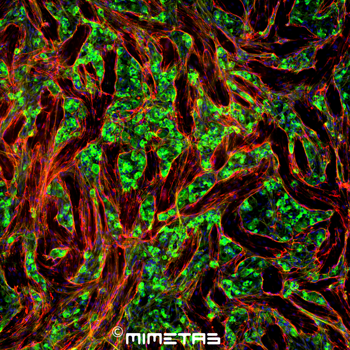Leiden, October 24, 2024 — MIMETAS has announced a breakthrough publication in Biofabrication, unveiling a new microvascularized in vitro liver model. This innovation represents a critical leap forward in drug discovery and disease research, addressing longstanding challenges in replicating liver function in non-clinical settings.
 The study describes the development of a liver microphysiological system (MPS) that successfully recreates the complex cellular architecture of the human liver. The model includes key liver cell types such as stellates, endothelial cells, and hepatocytes in a fully vascularized and scalable platform. This tri-culture setup not only mimics the microvascular structure essential for liver function but also provides a robust, high-throughput platform for drug testing and disease modeling.
The study describes the development of a liver microphysiological system (MPS) that successfully recreates the complex cellular architecture of the human liver. The model includes key liver cell types such as stellates, endothelial cells, and hepatocytes in a fully vascularized and scalable platform. This tri-culture setup not only mimics the microvascular structure essential for liver function but also provides a robust, high-throughput platform for drug testing and disease modeling.
Key Features of the Liver MPS Model:
- Microvascular Network: Endothelial cells self-organize into a network that supports liver tissue, replicating the blood flow crucial to liver function.
- Tri-culture System: The model includes hepatocytes, stellate cells, and endothelial cells, allowing for a more comprehensive representation of liver biology.
- High-Throughput: Implemented on a 64-chip microtiter plate, the model is designed for scalability and automation, making it ideal for large-scale drug screening.
- Disease Modeling: The system is capable of modeling liver diseases such as steatosis and fibrosis, offering new avenues for studying metabolic disorders and liver-related pathologies.
This microphysiological system has already demonstrated its utility in modeling liver steatosis, a condition characterized by the excessive accumulation of fats in liver cells. By administering fatty acids to the model, researchers successfully replicated the disease state and observed the protective effects of Firsocostat, a drug currently being evaluated in clinical trials. Additionally, the model showed promise in fibrosis research by activating stellate cells with TGF-β, mimicking fibrotic responses seen in chronic liver diseases.
Implications for Drug Discovery
The liver plays a crucial role in metabolizing drugs, making it a key organ in the development of pharmaceuticals. However, the lack of physiologically relevant models has contributed to high attrition rates in drug development, especially for diseases like metabolic dysfunction-associated steatohepatitis (MASH). This new liver MPS model is poised to change that by offering a more accurate, scalable, and reproducible platform for testing drug efficacy and toxicity.
The study, titled "A Microvascularized In Vitro Liver Model for Disease Modeling and Drug Discovery," is now available in Biofabrication. This groundbreaking work underscores MIMETAS’s commitment to pushing the boundaries of organ-on-a-chip technology, paving the way for more effective therapies and advancing personalized medicine.
